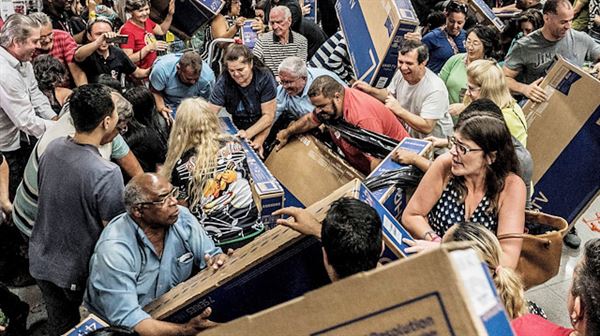Today's Black Friday, marking the start of the holiday shopping season, is coming under fire for encouraging consumption, and thereby leading to more
Today’s Black Friday, marking the start of the holiday shopping season, is coming under fire for encouraging consumption, and thereby leading to more fossil fuel use and damage to the environment.
Black Friday, the informal name for the Friday following Thanksgiving Day, normally the fourth Thursday in November, has been observed as the beginning of the U.S. holiday shopping season since 1952.
In recent years, however, it became a global phenomenon, with huge discounts offered on various goods, attracting hundreds and millions of shoppers.
But in addition to critics of materialism, the day is also under fire from environmentalists, as consuming more materials feeds growing demand for fossil fuels and so more damage to the environment.
Consumption leads to the need to access more basic materials which can only be mined or grown, and in either case, fossil fuels are needed to obtain these materials, according to an environmental scientist who until recently was a top science adviser to the British government.
“Material consumption is accelerating and, while we are replacing some fossil fuel use with sources of renewable energy, we are not building renewable energy capacity fast enough to stop a continued rise of fossil fuel consumption and, with it, production of greenhouse gases,” Ian Lamont Boyd, a biologist at Scotland’s University of St. Andrews, told Anadolu Agency.
Calling the day “another stunt, like many others through the annual cycle of the retailer,” he said Black Friday encourages the consumption of things that people neither need nor even want.
Saying that achieving “net-zero” carbon is difficult without cutting consumption, Boyd stressed that in order to make progress towards decarbonization, whole supply chains need to be decarbonized.
“If natural systems going through a state transition can be used to guide our thinking about how our economies and ways of life will be affected, then we should expect an increased frequency of extreme events including climate-related disasters such as floods and heat waves,” he warned.
When such disasters grow more frequent, this can sow social and political instability and fuel geopolitical tension, he added.
– Tax to curb fossil fuel use
In order to tackle over-consumption problem and the release of more carbon, Boyd suggested that governments introduce effective taxation including a carbon tax to cut consumption.
“This could be introduced at a modest level, but be ramped up over the next decade to severely penalize the consumption of fossil fuels and other potentially damaging materials,” he added.
Driven by such concerns and goals, many environmentalists will boycott the day and take part in a Global Climate Strike on Friday, Nov. 29, around the world.
In the Global Climate Strike this Sept. 20, more than 6,100 events were held in 185 countries, with the support of 73 trade unions, 820 civil society organizations, 3,000 companies and 8,500 websites, an event hailed as the biggest-ever climate mobilization with the participation of 7.6 million people.
